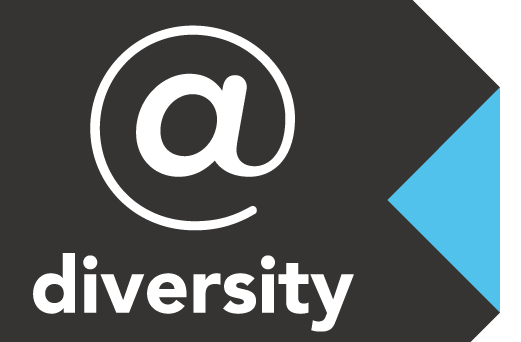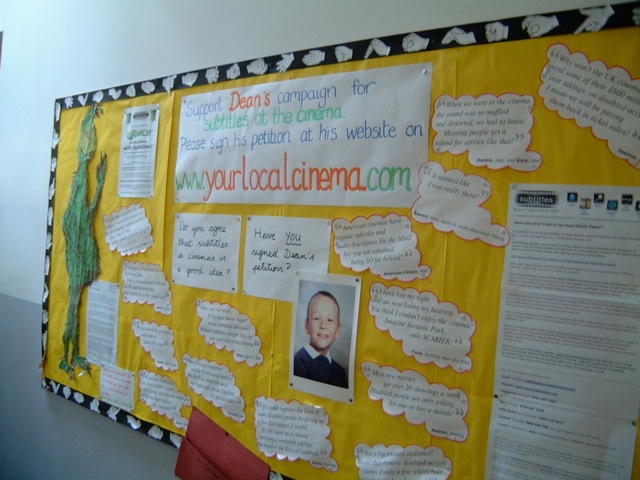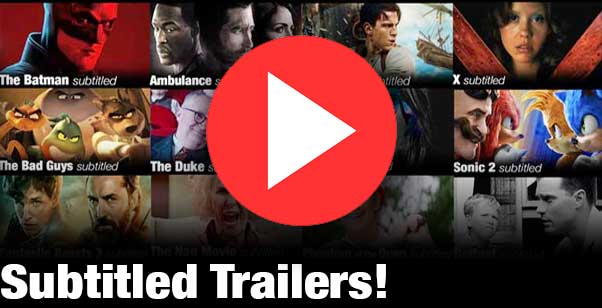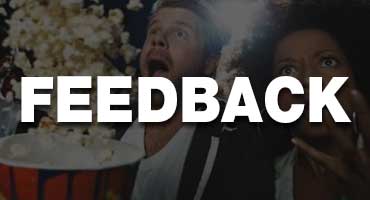About YourLocalCinema
By Dean, Manager, YourLocalCinema
(and profoundly deaf film fan).
“Accessibility is perhaps not the most exciting area of film, but knowing that a deaf child can follow the latest superhero or animated adventure on the big screen with their friends makes one feel good!”
Back in 2000, I went to a screening of animated film 'Chicken Run' at a London cinema. It was the UK's first English-language subtitled show, aimed at people with hearing loss. (I'm profoundly deaf due to a hospital infection at birth). My parents and I were the only ones there, and I remember thinking 'I wish my deaf friends were with me, they'd love it!' It turned out that apart from including it on the poster outside, the cinema didn't advertise the show, so nobody knew about it. We just happened to be passing and saw the poster.
Anyway, afterwards I wondered 'Why can't all films be subtitled at the cinema, like they are on TV?' So my parents and I investigated. It turned out that subtitle tracks WERE being produced - after the cinema release, in time for the films' 'home entertainment' release. It appeared that film companies just needed to ensure that subtitle tracks were produced earlier, in time for the cinema release, and cinemas just needed to make use of those tracks - to put on a few subtitled screenings each week.
So we began to contact the relevant people, the gatekeepers who decide on such matters, to try to persuade them to do their very best to make cinema films and shows accessible to film fans with hearing loss.
We reminded them that accessible, subtitled screenings remove the disabling barrier, which can help people to escape feelings of inequality, if only for a few hours at a time. We said that subtitled shows enable film fans with hearing loss to ENJOY rather than endure the cinema experience.
We pointed out that subtitles can benefit people of all ages: Each year in the UK, hundreds of children are born with significant hearing loss. Thousands of young people have hearing loss. Our society is ageing, and with ageing, loss of some hearing is inevitable. Fact is, access to film - via subtitles - is something that we may all appreciate, eventually. Accessible shows can help to achieve greater inclusion and community integration (and inspire more cinema visits).
We rounded up supporters to help and began building a grass-roots, social outreach initiative to help deaf children to socialise at cinemas with their families and friends. Over three years we built up a UK nationwide database - a ready-made audience of thousands of people interested in subtitled cinema shows.
Everyone was aware that subtitles had been provided for 'at home' viewing for decades. It was known that children of all ages, including pre-school, and those with language-based learning disabilities, could benefit from on-screen subtitles. It's a fact that subtitles improve foundational reading and literacy skills, such as phonics, word recognition, vocabulary acquisition, listening comprehension and fluency.
It seemed wrong that compared to TV, cinema was way behind in this area of accessibility. It was clear to us that subtitled children's films at cinemas could boost literacy skills in a fun and engaging way. Children's films, with less challenging vocabulary, would be ideal for providing the literacy benefits of reading, while listening and watching. Most children's films include songs, and as children like to sing along to songs and are curious to know the song lyrics, reading skills are practiced subconsciously.
We ran a nationwide petition in UK primary schools to gather the views of children with hearing loss and their families on accessible, subtitled cinema.
The response was overwhelming. People nationwide expressed their wishes for deaf children in their community to enjoy the cinema experience with their peers. One school, with only 12 deaf pupils, gathered almost 1,500 signatures.
The nationwide petition, along with our surveys and progress reports on accessible films, shows and audiences helped the UK film industry to compile its 2002 'Cinema Access Technologies for people with Sensory Impairments' report, which led directly to the UK's first 'Cinema Access Scheme' - a plan to make UK cinemas more accessible, utilising upcoming digital cinema solutions.
In 2004, impressed with our work, the UK film industry hired our non-profit social enterprise - YourLocalCinema.com - to run the marketing arm of the scheme - to promote accessible films and shows nationwide.
Today, 20 years after my first English-language subtitled cinema experience, my friends and I go to the cinema most weeks. It's unusual for a popular cinema release NOT to have a subtitle track. Almost all UK cinemas show a choice of the latest films with subtitles each week.
The UK film industry now pays me to run the non-profit, multi-award-winning 'YourLocalCinema' listings & information service that myself and my parents set up when I was nine. The popular website, supported by the BFI and film distributors (but not cinemas), receives more than a million visits annually.
Before 2000, the only way people with hearing loss could enjoy cinema was to watch a foreign-language film. Today, thanks to collaborative work between the UK film industry, YourLocalCinema, and charities representing people with hearing or sight loss, most cinemas are accessible.
Each year around 600 UK cinemas provide more than 80,000 English-language subtitled/captioned screenings of hundreds of films. A nationwide audience of thousands of film fans with hearing loss, many accompanied by family/friends, helped cinemas generate an estimated million admissions from English-language subtitled/captioned shows. More than £8m worth of cinema tickets.
It's estimated that more than ten million people live with some level of hearing loss, in every UK village, town and city. Each year in the UK, hundreds of children are born with significant hearing loss. Thousands of young people have hearing loss. Our society is ageing, and with ageing, some loss of hearing is inevitable. Access to film - via subtitles/captions - is something that we may all appreciate, eventually.
"Accessible, subtitled cinema shows provide social benefits such as equality and inclusion. For a few hours, the disabling barrier is removed, enabling film fans with hearing loss to ENJOY, rather than endure the cinema experience"
YourLocalCinema has raised, and continues to raise, the visibility of accessible cinema. Its popular website helps drive more than a million ticket sales annually. Helping to increase & improve UK cinema's access provision has made a positive, cultural, long-term impact on society. Here's some feedback from appreciative customers and peers:
https://www.yourlocalcinema.com/quote.html
Dean
YourLocalCinema
AN AWARD-WINNING SERVICE!
As well as providing an accessible listings service, YourLocalCinema gathers and maintains up-to-date market intelligence on everything cinema access-related, including audience data, analytics and valuable customer feedback & surveys. It has been successful in winning some high-profile awards voted for by the public and its peers in the UK film industry. Winning awards helps to spread awareness of 'accessible' cinema.

The Daily Mail 'People's Choice' Enterprise Award. The event, hosted by the Institute of Directors, recognises people who have turned their ideas into reality. Thousands of Daily Mail newspaper readers voted for the twenty finalists and YourLocalCinema received the most votes overall.

The @diversity European 'Access Culture' Award. Implemented by the European Commission and presented at the EU Culture Forum in Brussels, the awards celebrate innovative ways of using technology to make culture more accessible across Europe. More than 250 projects were submitted.

The Barco 'Innovation in Cinema' Award. Part of the 'Raam Awards', which recognise and reward the efforts & achievements of people working in the UK film industry.

The British Telecom 'Remote Workers' Award honours people who manage to run a successful business without an office, using mobile technology. Judges selected the winner based on the company that demonstrated how remote working had created the greatest positive impact.

The BKSTS 'Samuelson' Award recognises and rewards the efforts & achievements of companies that have embraced technology or enhanced accessibility to ensure that cinema exhibition is available to all people.

Finalist: The National Lottery Awards recognise the difference that lottery-funded projects have made to local communities. YourLocalCinema beat hundreds of projects, with many thousands of votes, to make the finals. The ceremony was broadcast live, primetime, on BBC1, exposing millions of people to YourLocalCinema's audience development work, and accessible cinema in general.
Nominated: Cinema Marketing Campaign of the Year, 2018 Screen Awards. Run by Screen International, the awards recognise excellence in UK film marketing, publicity and brand partnerships, acknowledging the teams and individuals that contribute to the success of the British film industry.

"SEE the dialogue! HEAR the action! It's the accessible cinema experience!"
Accessible, subtitled/captioned cinema shows have made a positive, cultural, long-term impact on society. They benefit people of all ages. Each year in the UK, hundreds of children are born with significant hearing loss (NDCS). It's estimated that more than ten million, including thousands of young people, have hearing loss (RNID). Our society is ageing, and with ageing, loss of some hearing is inevitable. Access to film - via subtitles - is something that we may all appreciate, eventually.
Feedback clearly indicates that opportunities to attend accessible shows are very much appreciated by many. Click HERE for a selection of positive experiences from film fans who we have helped to discover - or rediscover - the joys of cinema-going.
YourLocalCinema's Twitter feed receives regular 'retweets' from companies/people with a high number of Twitter followers, which helps to publicise accessible cinema far and wide, which leads to many more people visiting the YourLocalCinema website, and signing up for the weekly email/twitter newsletter.
Recent 'retweets': @WarwickADavis (Star Wars actor) “What a brilliant service! Respect to you for taking the time to make cinema accessible to all” (Retweeted to more than 680,000 followers); @cineworld (290,000); @ODEONcinemas (220,000); @BBCFilms (195,000).
Together, email and twitter help YourLocalCinema reach many thousands of film fans each week.
Subtitled Cinema News
Subtitle glasses, Carers card, New cinemas & more...
Our Valued Sponsors
We simply couldn't exist without them...
Accessible, inclusive subtitled/captioned shows enable film fans with hearing loss to ENJOY rather than endure cinema. For a few hours, the disabling barrier is removed. They provide social benefits such as equality, inclusion and community integration. Almost a million admissions to accessible shows in 2023!






